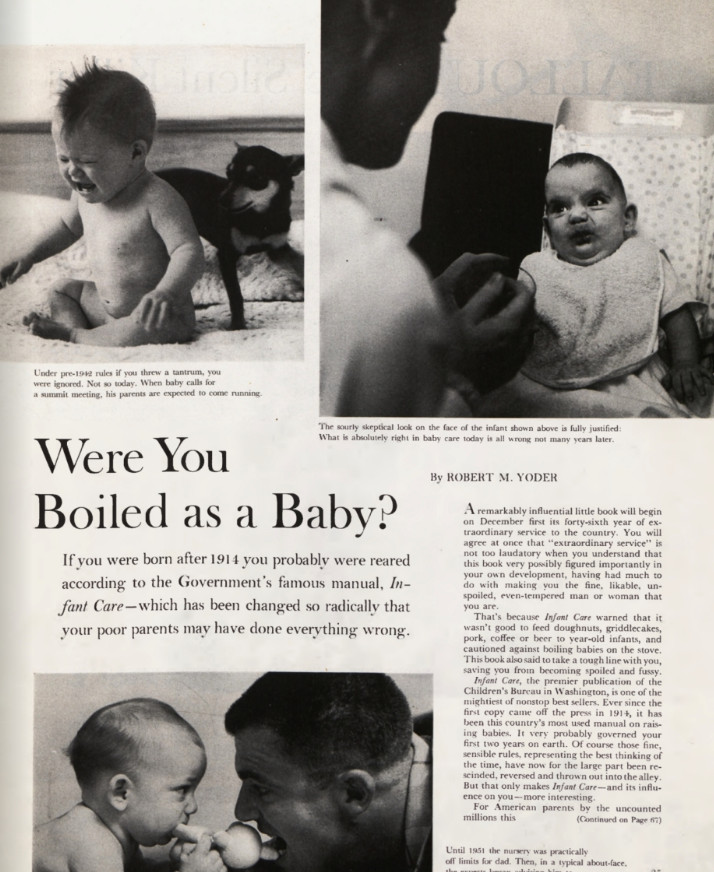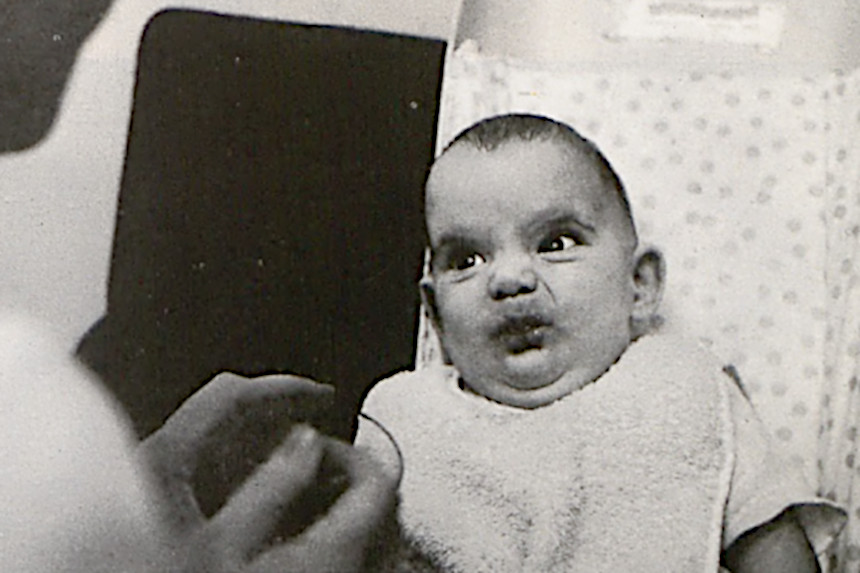Raising a child is hard work. And for all our resources and technology, it’s not getting easier.
For centuries, mothers could turn to tradition and her own mother’s example of what to do. But by the early 20th Century, Americans were starting to rely less on tradition and more on science and technology. And one of the trendiest ideas at the time was efficiency.
Efficiency experts believed there was a single “best” way of doing everything. They sought to reduce wasted time and motion in manufacturing, but their methods could be applied to any process.
And in 1910, the care of infants was a process that desperately needed improving. In that year, 27 percent of all deaths were of children under five years old, and 19 percent were infants less than a year old.
Two years later, Congress created the Children’s Bureau to look into every aspect of children’s welfare.
In 1914, the Bureau published a book of advice for the expectant mother: Infant Care. It was available from the government printing office for a dime. For decades, it was considered the definitive guide to childrearing through the first years of life. Generations were guided by its advice.
Over the next 50 years, the Bureau sold 40 million copies of the book. It was still being published in 1959 when the Post article called “Were You Boiled as a Baby?” appeared in our August 29, 1959, issue. In it, Robert M. Yoder looked back at the advice that appeared in early editions of Infant Care.
“Far more recently than you might suppose, Infant Care was cautioning mothers to take the baby’s bathtub off the stove before putting baby into it. Sometimes the coal or wood fire blazed up, and ‘blistered bottoms were not uncommon,’ the Children’s Bureau says.”
While no one would argue with such advice, other instructions would raise eyebrows of most modern parents.
The Scheduled Life — One of the first thing new parents were instructed to do was set an inflexible schedule for their child. Sleeping, eating, bathing — any daily activity should have an appointed time. Following a strict schedule was essential to children’s happiness, the experts said. “The habit of regularity in feeding and sleeping can be begun on the third day of life; and, once established, it must not be interrupted or broken for any reason except a real emergency.”
Limited Play — “A few minutes of gentle play now and then” was good for the baby. However, all babies need a great deal of rest and quiet, and most play was considered too exciting. Tickling and tossing made him irritable and restless. Rocking the baby, dandling him on the parent’s knee, tossing him, and shaking his bed or carriage could form bad habits, as they made the baby dependent on attention.
No Coddling — Parents were warned to not be swayed by their children’s tears. After all, infants cried to get their own way. “It is one of the worst habits he can learn — sufficient to make a spoiled, fussy baby and a household tyrant.
According to the 1919 version of Infant Care, “Parents must not start the habit of coaxing a baby to sleep by rocking, walking, or holding him, lying down with him, or holding his hand after he is put in bed…There is nothing to be gained by walking the floor with him.
“If the baby wakes between feedings and cries… do not hold him or rock him to stop his crying, and do not feed him until the exact hour for the feeding comes. It will not hurt the baby, even the tiny baby, to cry. Crying is the younger baby’s one means of expressing his needs and his dislikes Every baby can be trained to wait his full interval of three or four hours (whichever the doctor has ordered) before his hunger is satisfied. (There is no danger that crying will cause rupture.)”
The most important needs of a child, Yoder observed, seemed to be training, discipline, and a firm hand. “You were toeing the line long before you could walk a line.”
The Children’s Bureau had a change of heart, judging by its 1921 edition. A few minutes’ play with the child were permitted. And in 1939, parents — including the father, who’d had little notice in the pamphlet until now — were encouraged to play with their infant.
Reading the different editions of Infant Care, Yoder concluded “what is absolutely right in baby care today is all wrong not many years later. Authorities seem automatically to disagree with the authorities of the previous generation.”
By the time Yoder’s article appeared in 1959, Dr. Benjamin Spock’s bestseller, Common Sense Book of Baby and Child Care, had been in print for 13 years. His book became the advocate of flexibility and affection in parenting.
After a century of advice on caring for infants, you might expect the job to be easier. There is no shortage of books on the subject. Barnes & Noble’s website currently lists over 800 books on child care, and 245 books on infant care. Despite additional decades of research, definitive answers remain elusive. Books on attachment parenting and its philosophical opposite, “cry it out,” are both still best sellers.
But all the advice being offered today may not be helpful. In an article in Early Child Development and Care this year, researchers reported that parenting books can be harmful to new parents. They can raise mothers’ stress level and increase the likelihood of developing postpartum depression.
Several years ago, the Institute for Family Studies posted an article entitled “Why Parenting Has Gotten More Difficult.” Its author, Anna Sutherland, asked why parenting was so hard in an era when “the basic tasks of feeding, clothing, protecting, and educating kids have never been easier.”
Her answer? “the proliferation of parenting philosophies, health guidelines, educational options, and more.”
Parent have more options, more choices, and more decisions to make, including the big one, which didn’t even exist until 1965: whether or not to have a child at all.

Featured image: Esther Bubley for The Saturday Evening Post.
Become a Saturday Evening Post member and enjoy unlimited access. Subscribe now




Comments
Clearly, those baby photos are from the original article published in 1959. The author of this article is focused on what has changed. I’ll agree that it has not all been for the best outcome.
This is extremely appalling Jeff. The baby in the top picture looks like he’s a frightened, disgusted and possibly even angry all at the same time. At the very least he’s conveying “Oh, I don’t like this and I’m helpless to do anything.I need to get away but I can’t.”
A boiled bottom is no joke! When I was five and drying off from my bath, I burned my bottom on the steel wall heater with the red coils. I backed up too close and had vertical slat burns there for a couple of weeks in early ’63. So no, I wasn’t boiled as a baby, but burned myself before turning 6. It was painful and embarrassing too; not being able to sit down.
But enough about me. There’s too much information and not enough common sense about caring for a baby. You definitely need guidelines on what to do (and not to do) for baby. I agree with the first section of The Scheduled Life: It’ll establish habits that will make the baby happier, and you.
Limited Play: I agree with some of this, but also feel the baby herself/himself can be your best guide. I’m against any kind of shaking or tossing that could be frightening or possibly dangerous. Never good. Engage the baby in simple fun games where they get to win, and their smile will make YOU smile.
No Coddling: Once a baby has an established routine, they’re less likely to cry because the routine has a built-in anti-crying reassurance. Same thing with toddlers and even older. Over choice will overwhelm a child into tears. If a baby is crying, you need to see why and get to the bottom of it. Is she hungry, does he want attention, etc. If there’s a fever or illness, you need to know right away.
Spend time with that baby and make good eye contact with him or her playing simple games that don’t involve overstimulating “tech”! Make sure he or she has a quiet environment. When you’re out, have a pacifier handy they’ll find soothing. It helps to keep them from crying in the first place.
Good behavior starts in the home. Make sure they understand if they misbehave, privileges will be taken away. This way the child knows the punishment is something THEY inflicted on themselves, not you if they act up after being warned. Warnings are important. Say what you mean, and mean what you say or the child won’t respect you, and why would they if they can walk all over you?!